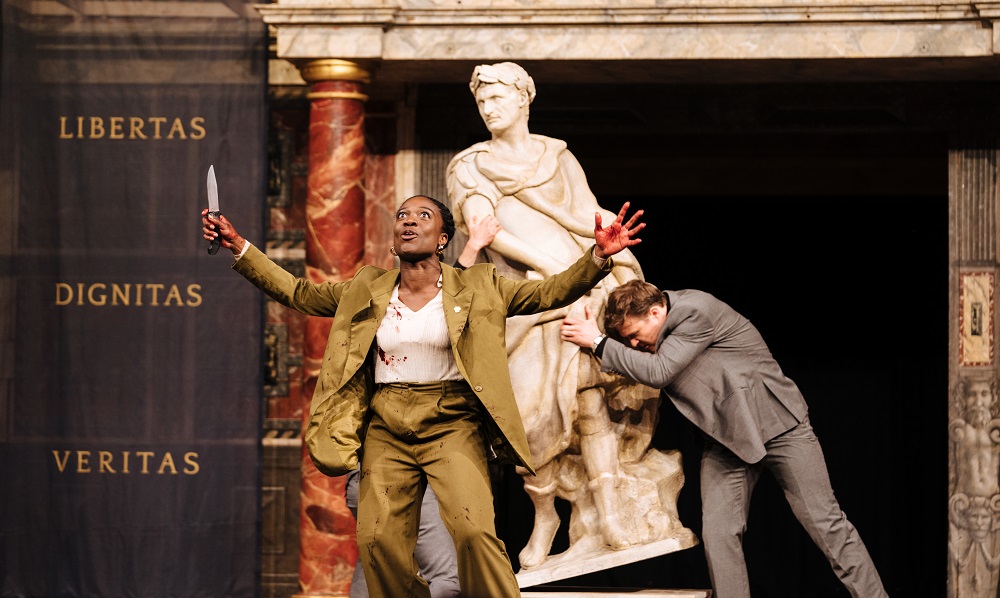
Review: Julius Caesar, Globe Theatre
Review: Julius Caesar, Globe Theatre
The review of Julius Caesar at the Globe Theatre: “It’s entertaining, the second half has plenty of action and some great delivery, the comical elements land almost without fail”
Julius Caesar comes to the Globe as more of a modern political commentary than a thriller or tragedy. Directed by Diane Page and set to embark on a tour, it is a scaled-down, low-budget and a bit confused adaptation of this classic history play that also, somehow, works pretty well.
The decision to cast both Brutus and Cassius as women who play women (both are referred to using she/her pronouns throughout the play) was a peculiar one – clearly, the aim here was to shine a light on the “invisible women of Rome”: women such as Fulvia, Mark Anthony’s wife who commanded an army, had a city named after herself and her visage appearing on coins. Fulvia was obviously, not included in Shakespeare’s play – but she could have been if Shakespeare wasn’t terrified of powerful women. Or so the play suggests.
For me personally, being somewhat of an ancient history nerd, this take is in and of itself extremely simplistic – the position of women in Rome was far more nuanced and, in many regards, far better than in many other periods of history. It is, however, interesting: having seen many a nonsensical theatrical gender swap in my life, this one at least has a point, and if this point sparks a debate, all the better. Not to mention that Charlotte Bate is an excellent Cassius, oscillating between overconfidence and trepidation at a moment’s notice. She is very physical in the role, very nimble and agile, and in many ways, exhibits a lot of “traditionally feminine” behaviours which makes her interpretation even more compelling. Anna Crichlow as Brutus isn’t, sadly, as impressive. Her monologues lack life and her exaggerated noble quiescence, although contrasts Cassius nicely, never sways the audience to her side. Her motives seem egoistical from the very beginning and never really do we believe her actions were driven by love for the Republic. She does have more of a presence as a military commander in the second act, but her lines never get a chance to resound as they could.
Mark Anthony’s (Samuel Oatley) speech at Ceasar’s funeral is the only monologue that really lands with the audience. It is extremely well thought through and Oatley’s delivery is nothing but excellent. The audience serves as a Roman mob – but it has never been persuaded by Brutus to begin with, thus making Mark Anthony’s task easier than expected.
And all this is even more perplexing given that Ceasar himself (Dickon Tyrrell) is made to be as unlikable as possible. Pompous, egocentric, and void of respect for his wife or friends, his death is more of a macabre extravagance than terrifying. However, the potential to make him a ruthless tyrant whose image is a product of a propaganda machine is wasted as well. Ceasar is unlikable, but not hateable, and an abundance of comical elements makes him more caricatural than scary.
The crucial part of the play, political tension and divisions, never really comes to fruition. The sense that the battle of Philippi is something more than a somewhat bloody conflict between four individuals – let alone that it is a battle that changed the course of history – just simply isn’t there. To be absolutely fair, however, there is considerable difficulty in showing it with a small cast of just 8 and almost no stage design.
Overall, the play has its issues – some bigger than others – but it *works*. It’s entertaining, the second half has plenty of action and some great delivery, the comical elements land almost without fail (a special nod to Jack Myers as Casca) and the audience’s immersion is absorbing enough. Not the best Julius Caesar in history, but certainly not the worst.
Image: Helen Murray







